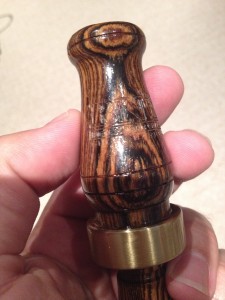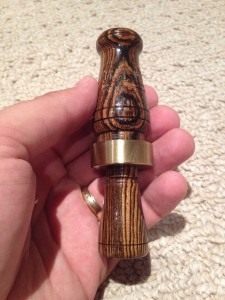The concept of deferred gratification, in a psychological sense, is that if an individual’s mind can be trained to delay a small reward in the short term for greater rewards in the longer term then research seems to indicate that those individuals who can defer rewards to a later period are typically more successful later in life.
Now, I can only trust the research at hand, but last weekend’s hunting in Bruce County seemed to bear out that hypothesis.
Having a real job, instead of my fantasy job of one day being a kept man who just goes hunting all autumn long, I was forced to miss the opening day and, by extension, the opening weekend of the 2015 early goose season due to work commitments in Western Canada. It isn’t the first time that’s happened and it probably won’t be the last time.
As I sat in the Calgary departures lounge I was ruing a missed opportunity. Historically, that early opener weekend has been a good few days of hunting with good weather, good friends, and willing birds that had not yet developed a hyper-sensitive wariness to decoys, goose calls, and ground blinds. Family and several friends had plans to be out in the fields with their shotguns, and the social media world was counting down to the opener with heavy anticipation.
As that opening weekend progressed I puttered around the house aimlessly, not really interested in cutting the grass, or getting groceries, or any of the other mundane things that needed doing. My mind was in the goose blinds with my friends and I lamented all the action, laughter, and fun they were no doubt having.
My Twitter feed was full of men and women who were out hunting their respective early goose (and in some realms, teal) seasons and I was getting more and more antsy. Finally, late on Sunday evening I texted one of the guys in our group for an update.
He informed me that they had shot two birds all weekend. I was slightly shocked.
I had plans to hunt the weekend of September 119th and 20th, which is the last weekend in our area before the goose season takes a five-day government-mandated hiatus, and I was worried by his report of slack shooting and limited suitable fields for hunting. I texted my cousin and he echoed the sentiment, but he did say that several fields were scheduled to be harvested in the week ahead and that when I arrived there would be greater opportunities to get after the geese.
Then the weather took a turn for the worse.
I arrived to the farm the Friday before the hunt, and there was a 100% chance of rain forecast for Saturday morning. Early in the season, our group has some shockingly fair-weather hunters in our midst. Nevertheless I set an alarm and woke to the sound of rain hitting the farmhouse rooftop. I still dressed and geared up, before texting my compatriots to see if they were down for getting a bit soaked in search of good shooting. One of them never even replied (no doubt fast asleep to the soothing patter of late summer rain at his window) while the other fellow said he was staying in bed.
So much for that, I thought.
I was just about to undress and get back in bed myself when my uncle arrived and we decided to forge out into the damp for a hunt.
We settled on a huge field that was frequently holding birds, but not surprisingly, they skirted our setup and landed a few hundred yards away. After a time, something got those birds off the ground (I still have no idea what it was that spooked them) and as their honks, clucks, and moans hit a crescendo, we flagged and called them our way. They slid past me on the furthest distance of my range, but they squared up nicely over my uncle and he scratched down a double. As he shot I swung at the trailing birds and sent them on their merry way with two shots that tore through the wind and drizzle but failed to connect with feather, flesh or bone.
One of the birds my uncle had shot was banded, and after a half hour of not seeing any more action we decided to dodge any more potential foul weather and headed home. I registered the band with my cell phone and found that the bird was two years old, was banded near Ypsilanti, Michigan, and was too small to even fly when it was banded in June of 2014. Bird band data is always interesting and puts the journey of these game birds into distinct perspective.
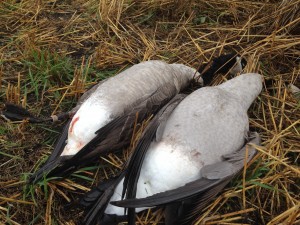
The weather steadily improved and after an early afternoon nap, I outfitted my six-year-old son and with renewed hope we headed for a field that my friend Brian had said was flush with birds earlier that day.
This spot did not disappoint.
As we walked in from the road, birds were already trying to land in the cut grain field, and after getting safely situated and inserting my son’s ear plugs I loaded up and the shooting began. Handfuls of geese traded across the skies steadily for the greater part of three hours and many groups worked our spread and responded to our calling. Eventually we decided it was time to go, but not before 23 geese were piled in the back of Brian’s pickup truck. We cleaned geese by the glow of truck headlights and then we sat at the picnic table at the farm under the starlight, sipping some cold beers and reliving the hunt that had ended just a few short hours earlier.
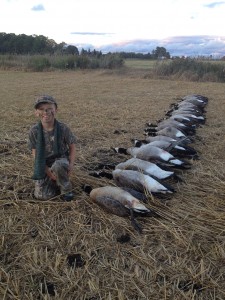
We planned a return to the same field the next morning, fully expecting to experience a fraction of what we had just been through. We were wrong in a very good way.
Geese whispered distantly in the dark as we put out decoys and found familiar hiding spots trampled down from the previous evening’s hunt. I checked my watch and settled in as legal light came and passed; it was not long before the shooting started in earnest.
A light breeze blew from the east while geese begin to wing their way around the Ferndale flats on the purples and burning oranges of a coming dawn sky. I flagged and called, trying to sound enticing and entirely non-threatening, and before long birds swung wide out over the cut grain field before dropping their feet into our spread. We opened up on them over and over again, and in more than one instance I was emptying my gun and immediately jamming more shells into it as line after line of birds seemed to make their way for our field.
Professionals call it “being on the ‘X’”. I just call it unreal goose hunting.
Geese fell, feathers floated in the sky, and Brian’s dog Levi worked retrieve after retrieve. All the while the pile of birds we were concealing in the long grass of the deep ditch that formed our blind grew and grew. Rough counts began to tell the story of the morning.
25…more birds.
29…a few more were fooled.
31…I shot badly that go around, punching holes in the air with my 870.
37…A great group and some excellent shooting; six came in and not a single bird left.
When we reached forty birds in the bag, we had a chat down the ditch. We decided on one more group and the birds promptly obliged by sending a good-sized flock over. The guns of seven hunters barked again in a carefully orchestrated cacophony, and five more geese found their way to hand before we set down our arms and traded laughs, smiles and high fives. We were done and Brian headed for the truck. My cousin Lukas joined him, because this was going to be a two-truck kind of morning.
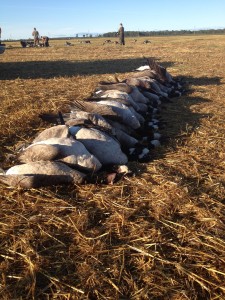
While we cleaned up, to a man we agreed that it had been one of the most memorable hunts we had been together for, and the weekend had seen a polar opposite of experiences from what had gone down just seven days earlier. In a way, it proved that waiting made things sweeter.
Still it was officially hunting season for me then, and the short week-long interval between that morning spent in the ditch and the morning that would kick off the opening of duck season on September 26th was going to drag by ever so slowly. Still, as I sat at the breakfast table that morning, a pile of decoys in Brian’s truck bed and lot of fresh goose meat waiting to be processed in the back of Lukas’, I was just basking in the afterglow of a fine morning spent afield.

